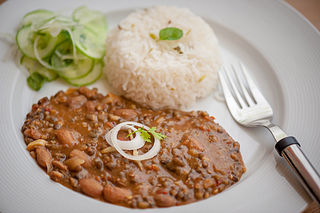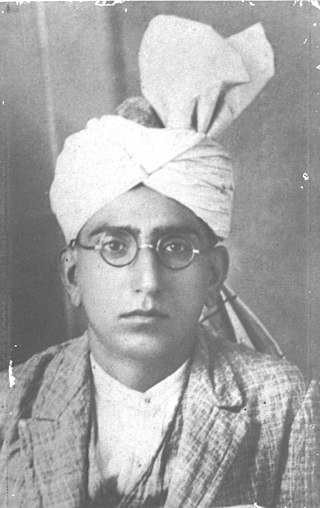Hissar means fort or castle in Arabic, with variants adopted into Persian and Turkish (hisar).

Dal makhani is a dish originating in Punjab region. A relatively modern variation of traditional lentil dishes, it is made with urad dal and other pulses, and includes butter and cream.
Pakistani clothing refers to the ethnic clothing that is typically worn by people in the country of Pakistan and by Pakistanis. Pakistani clothes express the culture of Pakistan, the demographics of Pakistan, and cultures from Punjab, Sindh, Balochistan, Khyber Pakhtunkhwa, Gilgit-Baltistan, and Kashmir regions of the country. The clothing in each region and culture of Pakistan reflect weather conditions, way of living, the textiles and embroidery used and its distinctive style which gives it a unique identity among all cultures.

Pashtun cuisine refers to the cuisine of the Pashtun people and is covered under both Afghan and Pakistani cuisines. It is largely based on meat dishes including mutton, beef, chicken, and fish as well as rice and some other vegetables. Accompanying these staples are dairy products, various nuts, local vegetables, and fresh and dried fruits. Peshawar, Islamabad, Kabul, Bannu, Quetta, Kandhar and Mardan are centers of Pashtun cuisine.
A pew is a long bench seat used for seating members of a congregation or choir in a church.
Abdur Rahman Peshawari, also known as Abdurrahman Bey, was a Turkish soldier, journalist and diplomat who was born in Peshawar in British India.
Chamkani, Tsamkani, or Samkani may refer to:

Chapli kebab or chapli kabab is a Pashtun-style minced kebab, usually made from ground beef, mutton or chicken with various spices in the shape of a patty. The chapli kabab originates from Peshawar in Pakistan. The Peshawari chapli kabab is made with beef and is a popular street food throughout South Asia, including Pakistan, India, Afghanistan and Bangladesh.

The Peshawari chappal is a traditional type of footwear of Pashtuns, worn especially by Pashtuns in the Khyber Pakhtunkhwa region. The shoe takes its name from the city of Peshawar, where it originates. While chappal is the word for flip-flops or sandals in Urdu, locals in Peshawar call the Peshawari Tsaplay. The shoes are worn by men casually or formally, usually with the shalwar kameez. Because of their comfort, they are worn in place of sandals or slippers in Pakistan.
Peshawar is the capital of the Khyber Pakhtunkhwa province of Pakistan.
Capture of Peshawar may refer to:

Peshawari turban, also Peshawari patke or Peshawari lungee, is the traditional turban worn in Peshawar and its surrounding regions.
September 2013 Peshawar bombings may refer to:
Pathans in India are citizens or residents of the Indian Republic who are of ethnic Pashtun ancestry. "Pathan" is the local Hindi-Urdu term for an individual who belongs to the Pashtun ethnic group, or descends from it. The term additionally finds mention among Western sources, mainly in the colonial-era literature of British India. Historically, the term "Afghan" was also synonymous with the Pathans. The Pathans originate from the Eastern Afghanistan and Northwestern Pakistan regions, ethnolinguistically known as Pashtunistan.

Uzair Gul Peshawari was an Islamic scholar and an activist of the Indian freedom struggle against British rule who actively participated in the Silk Letter Movement. He was an alumnus of the Darul Uloom Deoband and served as the head-teacher of Madrasa Rahmania in Roorkee.
This page is based on this
Wikipedia article Text is available under the
CC BY-SA 4.0 license; additional terms may apply.
Images, videos and audio are available under their respective licenses.





